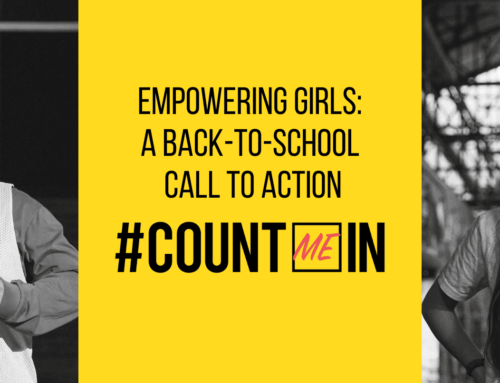It’s not every day that you watch an online corporate campaign and think to yourself: “They’ve nailed it!” This is what I said after seeing the new Always campaign, ‘Like A Girl’. It powerfully captures everyday sexism that plagues our cultural perceptions of gender and disempowers girls at a young age to believe they are weaker than boys.
Before I delve deeper into this topic, watch the campaign video for yourself here. The caption reads, “Using #LikeAGirl as an insult is a hard knock against any adolescent girl.” Twitter conversations have taken off using the hashtag.
How many times have you heard someone say, “You run like a girl” or “You throw like a girl”? Or they simply try to insult you by comparing you to this weak person that a ‘girl’ represents. How many times do boys and men hear, “Don’t be such a girl”?
I hear this ‘insult’ all the time. And I always respond by saying, “Yes, I do X like a girl. What’s your point?”
I grew up with my cousins and neighbours who were all boys. I never felt different than those boys when it came to playing sports, playing video games, speaking up for myself or acting tough in difficult situations (I lived through war and spent my pre-teen years in post-war time madness). I never thought there was a difference between boys and girls.
I excelled in all sports and my parents encouraged me to be equal with all my male counterparts. I truly felt that I was equal with boys. Thinking back now, I realize I was defying traditional gender roles every day. But I wasn’t the only one. There were plenty of girls who were defying gender roles in their own way. We were part of a new generation of girls unwilling to accept the gender stereotypes that limited our potentials.
Then I grew up. I realized then that to exert my ‘equalness’ I had to fight hard. It didn’t get easier. It became even harder to do this as I grew older.
I used to play basketball with my male friends during my university years and as we would line up for the two team captains to pick players, I would be the last one chosen. Mind you, I was a better player than half of those men. So to overcome this issue, I decided I will make sure I am always one of the team captains so I won’t be picked last. No questions asked. I had to take a leadership role – what many call ‘being bossy’. I succeeded and became the team captain. It became known to all that if I’m playing, I refuse to be picked in a line up. If another woman would join the team, I’d make a point that she wouldn’t have the same experience. This wasn’t a special arrangement made for the girl in the team. This was an arrangement made because the boys couldn’t (or wouldn’t) put aside their gender stereotypes.
When playing football, I would always be the quarter back. That was my strength. I simply had a good arm and I throw like a pro (a comment once made by my professional football player friend that empowered me to believe in myself). When new guys would join the team, they always brushed me aside. One time a guy whispered to his friend, “they let a girl be their quarter back?” So he decided to join the other team. Thanks dude, you’re totally ignorant! His team lost, because well, we rocked!
I put up a photo on my Facebook throwing a football (not to brag that I’m a good quarterback, but simply because it was a great shot). The first comment I received read, “You throw like a girl”. Then came a slew of comments, by friends who stood up for me. One read, “She throws it as good as Chuck Norris would”.
It’s not only men that make sexist comments. I can’t count the number of times women have made the comment, “She’s different. She’s like a guy”. It really hurts to hear that, especially when it comes from your close friends who understand that gender equality is a constant struggle for women. Here they are, women, restricted by the same gender stereotypes, limiting my vision of a sky full of opportunities.
The conclusion I’m trying to make is not that I’m great in sports. The conclusion here is that we restrict ourselves when we take culturally constructed gender roles as the reality of our biological making. What restricts us is social attitudes towards our actions and behaviours. If every time I heard someone say, “Don’t pick that up, it’s heavy” or “It’s only guys playing, you wouldn’t like it” or “Just accept it, you’re a woman and you’re weaker” – I wouldn’t have excelled in the hobbies that make me happy and healthy today.
Men and women need to realize that their words can discourage someone from taking action. Their words and attitudes can break confidence and shatter dreams. I am grateful for having grown up in a family where we proactively defied gender roles. I am grateful for having friends who support me and speak up when ignorant comments are made by other men. But to make lasting change, it’s society as a whole that needs to evolve their perceptions of gender roles.
I’m looking forward to a day when we won’t use these phrases that constrict us and imprison us into believing that our potentials have limits.
So is “Like A Girl” an insult? No, it isn’t and it shouldn’t be. But the reality is that most people use it as an insult to limit women and girls’ potentials or to put down boys and men. Let’s take back the saying ”Like a Girl” because damn right – I throw like a girl, I run like a girl, I speak up like a girl – and I’m proud!
Learn more:
The Facts – Barriers that Girls Face







